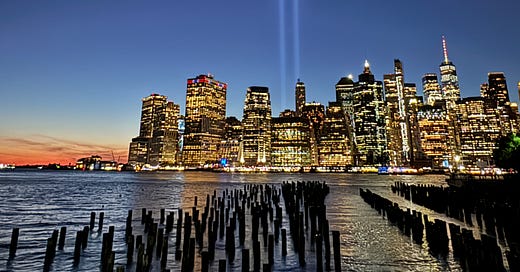Everyone has a 9/11 story. This is mine.
An excerpt from my memoir, on the 23rd anniversary of that day.
Last night, as the sun set, my partner and I biked home to Brooklyn along the Hudson River bike bath from a CaringKind Walk kickoff party in midtown. (He’s the co-chair of this year’s walk on October 19th to raise money for an organization that was critical to both him and his wife a…
Keep reading with a 7-day free trial
Subscribe to Ladyparts to keep reading this post and get 7 days of free access to the full post archives.





